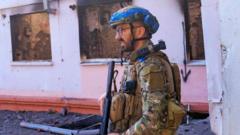In a significant escalation of hostilities, Ukraine has initiated a counterattack in Russia's Kursk region, reigniting fierce fighting that has persisted for a second consecutive day. After first launching an incursion in August, Ukrainian forces, as reported by Russian state media, made a considerable assault on Sunday, prompting Moscow to respond with both artillery and air power in an effort to repel the offensive. The Russian defense ministry indicated that their troops succeeded in thwarting a breakthrough attempt by Ukraine; however, independent verification of these claims remains elusive.
In response to the escalating conflict, Andriy Yermak, head of Ukraine's presidential office, suggested positive developments were occurring in the Kursk region, asserting that Russia "was getting what it deserves." He has not elaborated further on the specifics of Ukraine's ongoing military strategy. Reports indicate that during the recent confrontations, Ukrainian forces targeted the village of Berdin, deploying a detachment that included two tanks and twelve armored vehicles, which the Russian military claims to have largely destroyed.
Despite the aggression displayed by Ukrainian forces, some Russian commentators have speculated about the possible meanings of this renewed offensive, with opinions differing on whether it serves as a strategically important diversion or marks the onset of a larger operation elsewhere. The ongoing situation in Kursk also brings forth concerns regarding manpower shortages within the Ukrainian ranks; in recent months, reports suggest they have faced challenges in maintaining territorial integrity, particularly in the eastern regions.
Moreover, the conflict has reportedly drawn in external elements, with unconfirmed reports of North Korean troops engaging Ukrainian forces in the Kursk area, a surprising development linked to previous Ukrainian incursions into Russian territory. President Vladimir Putin condemned these incursions as a significant provocation, leading to evacuations of nearly 200,000 residents in the border areas.
While the situation unfolds, Ukrainian President Volodymyr Zelensky emphasized during a recent podcast that securing effective peace guarantees must involve negotiations with influential figures in the U.S., specifically citing Donald Trump's potential role in alleviating the conflict. Zelensky expressed hope for a collaborative agreement that might prompt discussions with Russian authorities.
In contrast, French President Emmanuel Macron provided a cautionary note, advising Ukraine to adopt a "realistic" perspective regarding territorial negotiations and asserting that there would be no simple or rapid solutions to the ongoing crisis. As military and diplomatic actions continue to evolve, the dynamics between Ukraine and Russia maintain significant implications for regional stability and global political alignments.
In response to the escalating conflict, Andriy Yermak, head of Ukraine's presidential office, suggested positive developments were occurring in the Kursk region, asserting that Russia "was getting what it deserves." He has not elaborated further on the specifics of Ukraine's ongoing military strategy. Reports indicate that during the recent confrontations, Ukrainian forces targeted the village of Berdin, deploying a detachment that included two tanks and twelve armored vehicles, which the Russian military claims to have largely destroyed.
Despite the aggression displayed by Ukrainian forces, some Russian commentators have speculated about the possible meanings of this renewed offensive, with opinions differing on whether it serves as a strategically important diversion or marks the onset of a larger operation elsewhere. The ongoing situation in Kursk also brings forth concerns regarding manpower shortages within the Ukrainian ranks; in recent months, reports suggest they have faced challenges in maintaining territorial integrity, particularly in the eastern regions.
Moreover, the conflict has reportedly drawn in external elements, with unconfirmed reports of North Korean troops engaging Ukrainian forces in the Kursk area, a surprising development linked to previous Ukrainian incursions into Russian territory. President Vladimir Putin condemned these incursions as a significant provocation, leading to evacuations of nearly 200,000 residents in the border areas.
While the situation unfolds, Ukrainian President Volodymyr Zelensky emphasized during a recent podcast that securing effective peace guarantees must involve negotiations with influential figures in the U.S., specifically citing Donald Trump's potential role in alleviating the conflict. Zelensky expressed hope for a collaborative agreement that might prompt discussions with Russian authorities.
In contrast, French President Emmanuel Macron provided a cautionary note, advising Ukraine to adopt a "realistic" perspective regarding territorial negotiations and asserting that there would be no simple or rapid solutions to the ongoing crisis. As military and diplomatic actions continue to evolve, the dynamics between Ukraine and Russia maintain significant implications for regional stability and global political alignments.




















